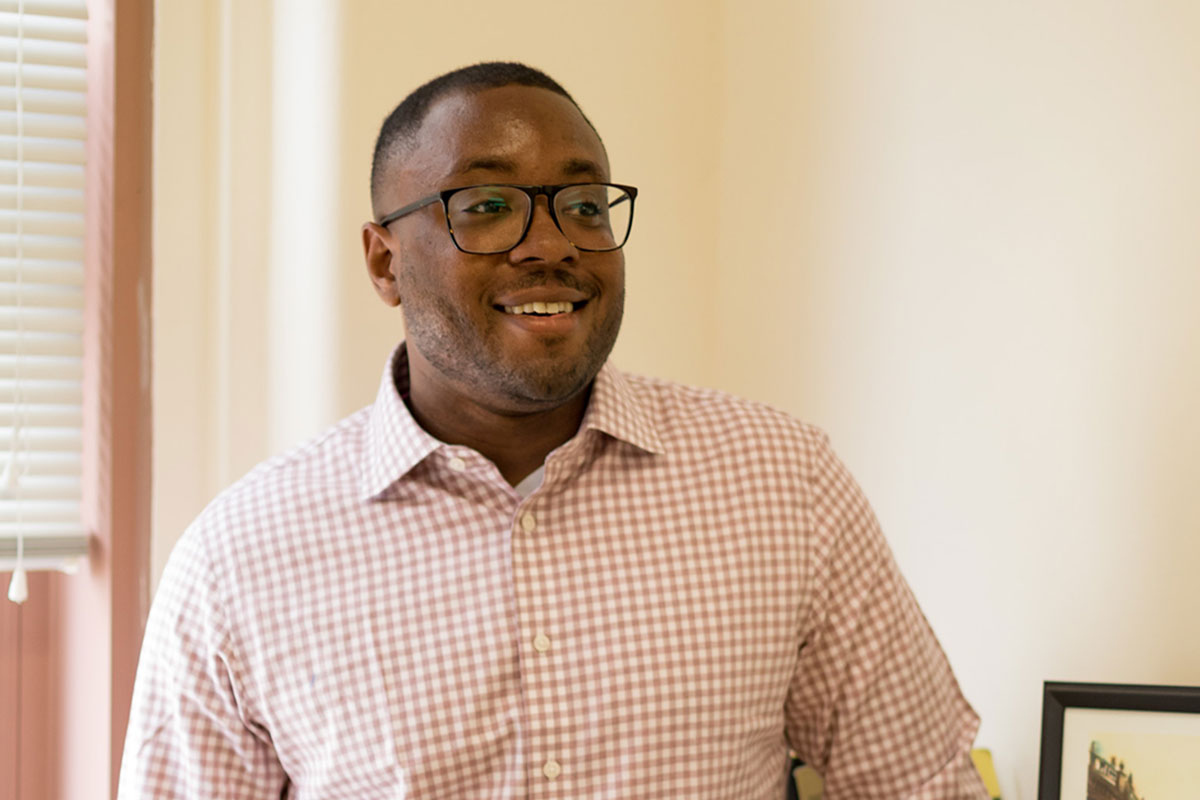Each year at Teachers College (TC) the Minority Postdoctoral Fellowship is awarded to one distinguished scholar from a historically underrepresented group. The two-year fellowship offers recipients the opportunity to participate as active members of the TC community while developing their own research programs. This year’s fellow, Michael Hines, is a historian of education whose research focuses on African-American education in the early twentieth century. “I'm interested in the ways that History and Social Studies curricula, in particular, portray African-Americans, and how African-Americans have created alternative curricula to challenge, subvert, and upend racist depictions of themselves in traditional curricula.”
During the first year of his fellowship, Hines has pursued two strands of research. The first is a project tied to his dissertation which asks how the Second World War changed the way that K-12 educators in Chicago taught and thought about race. His second line of inquiry investigates the educational experiences of black enrollees in the Civilian Conservation Corps (CCC), a New Deal era program.
“The CCC camps were segregated. So within a camp, they would have had a few hundred African-American young men and then, because it was run by the War Department, they would always have white officers in command. All the people running it at the camp-level were white; all the enrollees were black. Very interestingly, the only black people who were allowed to have a position of authority within the camp were the educational advisors—the teachers. So that's what originally drew me to this topic: What was the role of these teachers? Where did they come from? What was their background? What were they teaching in these camps?” In March, Hines delivered a talk about this research for TC’s History and Education colloquium series; he also presented his research at a panel session during this year’s AERA conference.
Hines is drawn to the 1930’s and 40’s because he sees this as an era of massive experimentation in educational programming. He believes contemporary educators and policymakers would benefit from understanding the successes and failures of these historic programs. “Experimental programs like the CCC and the National Youth Administration give us some ideas and models from the past for how change happens; they show us how people in the past have thought about addressing issues of educational access. That’s not to say that history gives us foolproof plans or that we can take a model from the 1940's and drop it into the present, but it gives us something to think about. That's what history is good for, giving us models that we can toy around with to see what works and what doesn't work and what needs to be adapted. Like David Tyack and Larry Cuban point out, history provides a set of experiments that have already been conducted, so you can look and ask ‘what went wrong? how can we change this? how can we make this better and improve it?”
Hines cites his mother, a lifelong educator, as his earliest career influence. “My mom started out as a teacher, then an assistant principal, then a principal, then a district leader. We had a dinner table where education policy was just one of the things that we talked about because my mom would come home and say ‘well this mandate came down from central office, and this is what I dealt with at school today.” Hines earned a B.A. in History at Washington University in St. Louis and spent four years as a K-12 Social Studies and English Language Arts teacher in Washington DC before pursuing his M.A. and Ph.D. in Cultural and Education Policy Studies at Loyola University Chicago.
As an early-career scholar, Hines has enjoyed support from the faculty of TC’s History and Education program. “They have been more than gracious in helping me develop a plan for how to best utilize the time that I’ve been given here.” The fellowship has also provided him with unique professional development experiences. “I really value the opportunity to step behind the curtain to see how TC as an institution works: attending faculty meetings, attending department meetings. I’m at the beginning of what I hope will be a very long and productive academic career and being able to see how a really high-level institution works is something that will be really valuable going forward.”
The Minority Postdoctoral Fellowship was created in 1996 and allows each recipient to work closely with a TC department of their choosing. There have been 30 past fellows, three of whom are current members of TC's faculty. The first fellow ever to receive the award was Dr. Cally Waite, now a professor in TC’s History and Education program. Of his relationship with Dr. Waite, Michael says, “It feels like something has come full circle because I’m the first historian of education to receive the fellowship since Dr. Waite and now I’m able to work with her as a mentor. It’s a bit like I’m slipping into her shoes, especially because, back when she was a fellow, she lived in the same faculty housing apartment where my wife and I are currently living.”
What’s next for Hines? He plans to continue to teach and produce high-quality historical research that will serve policy makers and educators. “I really think there is a lack of historical context when we talk about education and inequity and inequality in education. History of education brings a context that's often missing in these conversations. It’s so important to get this information in front of the right people—in front of policymakers, in front of teachers, in front of parents—so that they're informed when it comes time to vote, when it comes time to make decisions about the direction of American education.”
